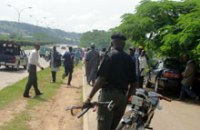Nigeria labor unions launch strike to protest deeply flawed presidential elections
The labor unions launched a two-day, stay-at-home strike to protest Nigeria's deeply flawed presidential elections.

Schoolchildren stayed home, banks were shuttered and traffic was thinner in many streets and markets across the major urban centers on Monday, as security forces put down brief protests in the main city of Lagos.
The work stoppage did not appear to gain full participation nationwide, but the labor unions said it got off to a good start.
"The strike has been successful," said Owei Lakemfa, a spokesman for the umbrella Nigerian Labor Congress. He said the bloc was seeking "general paralysis" of the nation, one of the world's top oil producers.
Yar'Adua is to take power Tuesday from President Olusegun Obasanjo in what would be Nigeria's first-ever transfer of power between civilian leaders.
But unions arranged the strike after Yar'Adua's governing party landslide victory in an April vote that the opposition has rejected as rigged and international observers said was not credible.
Schools were shut nationwide Monday, and banks closed in many city centers across the nation. Markets, where workers are unsalaried and must earn money to buy food, opened in many communities, but without the usual bustle.
Protesters burned tires in the streets of Lagos before heavily armed security forces, who fanned out across the restive opposition stronghold of 13 million people. Police stopped and searched cars _ and many Nigerians stayed off the streets.
"Protesters are scared of the soldiers, nobody wants to be killed," said Alani Bakare, a taxi driver who said he saw soldiers shoot into the air to disperse protesters in the Costain district of the city.
Many Nigerians ascribed the diminished activities to rumors that Monday was a national holiday, as some local radio stations reported. While Tuesday has been declared a holiday for Yar'Adua's inauguration, Monday had not, the federal government said.
Many pupils were told Friday not to come to school on Monday, which would normally have been an annual school holiday marking "Childrens' Day." Banks were also shut, but workers in the main city of Lagos said that was because they believed it was a public holiday.
In the capital, Abuja, it was business as usual. The sparsely populated city, where Yar'Adua's investiture is to take place, is a created capital where few people live and is the seat of the federal government. Civil servants went to work as usual, and banks and markets opened, although schools were shuttered.
Streets were mostly empty in northern Nigeria, where opposition party structures are strong, but some cars and pedestrians were seen.
The unions, which claim millions of workers among Nigeria's 140 million people, are demanding an interim government take over from Obasanjo and rerun the April elections. The government has refused.
Obasanjo's ruling People's Democratic Party won the April general elections in a landslide. But irregularities were on open display, with reporters witnessing thugs stealing ballot boxes, buying votes and intimidating voters, who cast ballots in the open without privacy.
Electoral officials thumbprinted ballots and stuffed boxes. In some wards no vote was held at all, with massive wins later declared for the ruling party candidate, observers said.
The opposition says the ruling party rigged the vote, and international observers said it failed to live up to a standard that would have definitively reflected the will of the electorate.
Obasanjo, who was prevented by term limits to seek a third term, took power after 1999 elections, ending 15 years of brutal military rule. All other attempts to pass the office of president between civilian heads of state since independence from Britain in 1960 were interrupted by coups d'etat or annulments.
Subscribe to Pravda.Ru Telegram channel, Facebook, RSS!





